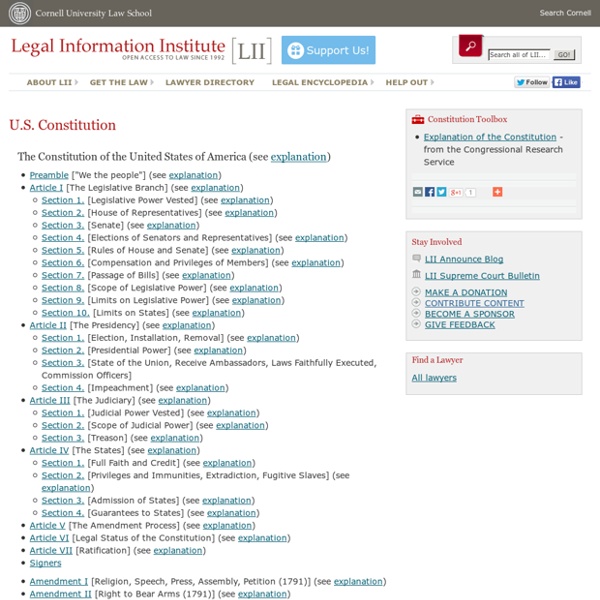



https://www.law.cornell.edu/constitution/overview
The Enhanced-Precision Political Quiz in 2D The Enhanced-Precision Political Quiz Version 7 release, updated August 2012. More options. More objective. More up to date. And pretty close to a final version. Forgotten Founding Fathers This Saturday is July 4, a day when Americans of all shapes and sizes will come together to commemorate the founding of their country, and the noble pursuit of life, liberty, and overcooked hamburgers. Here's a quick quiz question "“ how many people signed the Declaration of Independence? We're betting that few of you, not including the people who compulsively Googled that question, knew the answer is 56. Fifty-six?!
Socialist Party of Canada - What Socialism Means Socialism Has Never Been Tried When It Is Tried It Must Be Established Globally World Socialism Can Only Be Brought About Democratically We begin with these three points because they are vital to any kind of an understanding of what we mean by socialism. We reject the idea that socialism has been tried in countries sometimes referred to as socialist. Look below at our definition of socialism and ask yourself if this in any way describes the state capitalist, police states of modern China and Cuba or the old regimes in Russia and eastern Europe, or the past and present "social-democratic" governments in many countries.
The Originalist Perspective An excerpt from The Heritage Guide to the Constitution Written constitutionalism implies that those who make, interpret, and enforce the law ought to be guided by the meaning of the United States Constitution--the supreme law of the land--as it was originally written. This view came to be seriously eroded over the course of the last century with the rise of the theory of the Constitution as a "living document" with no fixed meaning, subject to changing interpretations according to the spirit of the times. In 1985, Attorney General Edwin Meese III delivered a series of speeches challenging the then-dominant view of constitutional jurisprudence and calling for judges to embrace a "jurisprudence of original intention." There ensued a vigorous debate in the academy, as well as in the popular press, and in Congress itself over the prospect of an "originalist" interpretation of the Constitution.
United States Cabinet The Obama Cabinet (as of July 26, 2012) All Cabinet members are nominated by the President and then presented to the Senate for confirmation or rejection by a simple majority. If they are approved, they are sworn in and then begin their duties. Aside from the Attorney General, and the Postmaster General when it was a Cabinet office, they all receive the title of Secretary.
The Bill of Rights (including the Preamble to the Bill of Rights) Young Democratic Socialists - Home Constitution Society Home Page In Defence of Marxism Candidates on the Issues